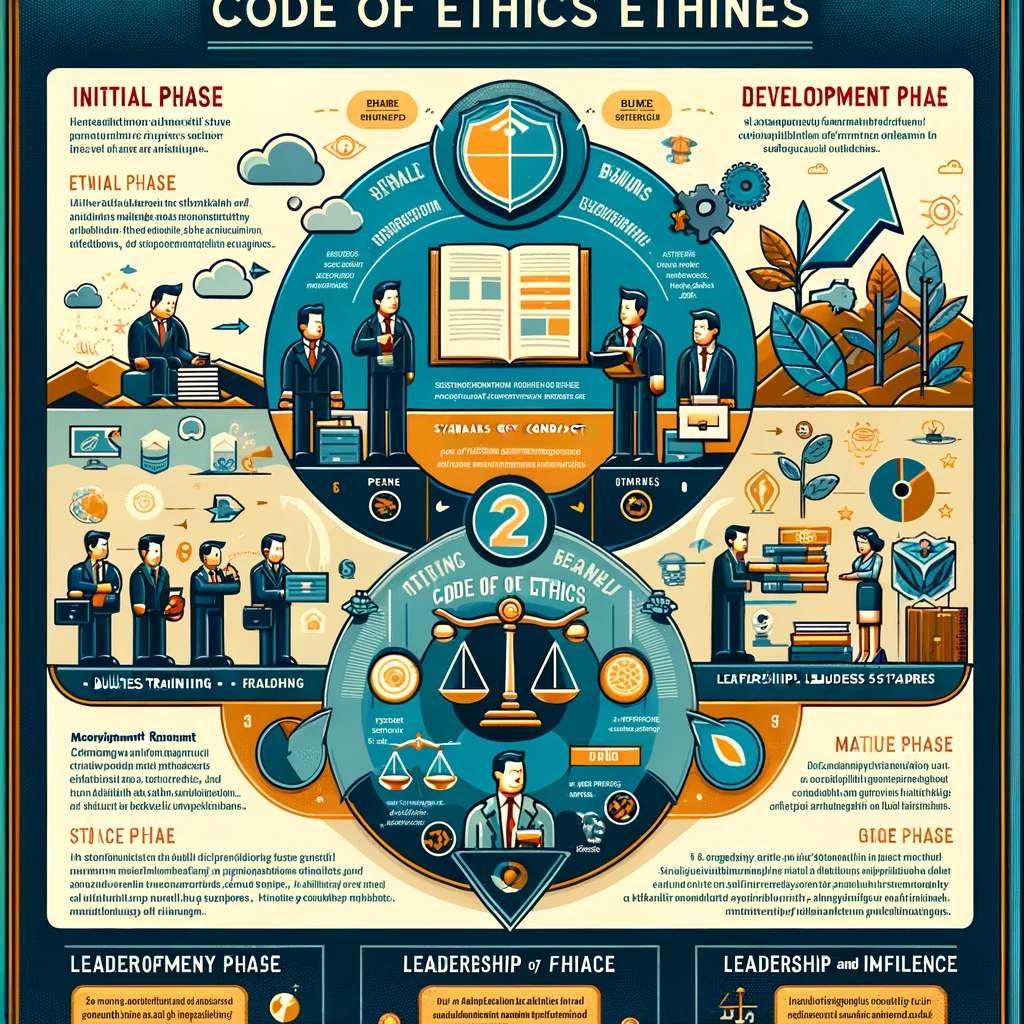In the realm of business, a code of ethics in Business serves as a foundational set of guidelines or principles that dictate the acceptable norms and practices within an organization. It is an integral part of corporate governance, offering a clear framework for ethical decision-making and conduct. Essentially, a code of ethics outlines the organization’s values, responsibilities, and ethical obligations owed to all stakeholders, including employees, customers, shareholders, and the broader community.
The importance of ethics in business cannot be overstated. At its core, ethics in business ensures that companies operate fairly and responsibly, fostering trust and respect among consumers and partners. An ethical business environment encourages transparency and accountability, which are critical for maintaining a company’s reputation and long-term success. In today’s interconnected and socially conscious world, businesses that disregard ethical standards risk not only legal ramifications but also the loss of customer loyalty and employee engagement.
Furthermore, a strong code of ethics can be a significant competitive advantage. It attracts customers and employees who value integrity and moral conduct, and it can also be a factor in attracting investors who are increasingly focusing on ethical practices and corporate social responsibility. In summary, a code of ethics is not just a compliance document but a strategic asset that upholds the integrity of a business, guiding it towards sustainable success.
Table of Contents
The Purpose of a Business Code of Ethics
A Business Code of Ethics serves multiple critical functions within an organization, playing a pivotal role in shaping its culture, operations, and public image. Some of the key purposes include:
Establishing Trust with Customers and Partners: A well-defined code of ethics is instrumental in building and maintaining trust with customers and business partners. In today’s market, consumers and business associates are increasingly conscious of ethical practices and prefer to engage with companies that demonstrate integrity and social responsibility. A commitment to ethical principles assures stakeholders that the business operates with honesty, fairness, and in compliance with legal and moral standards. This trust is fundamental for fostering long-lasting relationships and a loyal customer base.
Creating a Baseline for Employee Behavior: The code of ethics serves as a guideline for employees, outlining the expected standards of conduct and decision-making processes within the organization. It helps create a cohesive understanding of what is acceptable and what is not, guiding employees in various situations, especially those that might not be explicitly covered by law or company policy. This baseline helps in fostering a positive workplace culture where ethical behavior is valued and promoted, leading to higher employee morale and productivity.
Protecting the Company’s Reputation and Legal Standing: Upholding a code of ethics is crucial for safeguarding a company’s reputation and legal position. Ethical breaches can lead to serious reputational damage, loss of customer trust, and potentially significant legal consequences. A strong ethical code helps in preempting unethical conduct and ensures that the company and its employees abide by the laws and regulations governing their operations. In an era where information spreads rapidly, maintaining an untarnished reputation is essential for business survival and growth. The code of ethics, therefore, acts as a protective measure, ensuring the company’s actions align with societal expectations and legal requirements.
A Business Code of Ethics is not merely a set of rules; it is a reflection of the company’s core values and commitment to operating with integrity. It influences every aspect of the business, from internal interactions to external relationships, playing a crucial role in shaping its success and sustainability.
Key Components of an Effective Business Ethics Code
An effective Business Ethics Code is comprised of several fundamental components that collectively establish the ethical framework and standards for a company. These components not only define the ethical obligations of the company and its employees but also serve as a guide for daily operations and decision-making processes. The key components include:
Honesty and Integrity: This aspect emphasizes the importance of truthfulness and transparency in all business dealings. It requires that employees and the organization as a whole conduct themselves with sincerity and honesty. This includes avoiding misleading information, misrepresentation, and deceitful practices. Integrity also involves maintaining a consistent adherence to ethical principles, even in challenging situations, thereby fostering trust and credibility with stakeholders.
Accountability: Accountability is crucial in ensuring that individuals and the organization as a whole are answerable for their actions. This component of the ethics code involves taking responsibility for decisions and their impacts, both positive and negative. It encourages a culture where employees and management can openly acknowledge mistakes, learn from them, and take necessary corrective actions. This openness not only builds trust but also promotes a learning and growth mindset within the organization.
Respect: An ethical business environment is one where there is a profound respect for individuals, regardless of their role, background, or personal characteristics. This includes valuing diversity, promoting inclusiveness, and fostering a respectful work environment where everyone is treated with dignity and fairness. Respect in the workplace contributes to employee satisfaction, collaboration, and productivity.
Compliance with Laws: Adherence to all applicable laws and regulations is a non-negotiable component of a business ethics code. This ensures that the company’s operations are legal and align with the standards set by regulatory authorities. Compliance involves understanding and keeping up-to-date with relevant laws, including those related to labor, trade, environmental protection, and financial reporting.
Confidentiality: Protecting the confidentiality of sensitive company and customer information is vital. This component of the ethics code underscores the importance of safeguarding data and information that could be harmful if disclosed. It involves respecting privacy rights and handling information with care, ensuring that it is not misused or shared inappropriately.
These components, when effectively integrated into a company’s policies and culture, create a robust ethical framework. They guide behavior, support ethical decision-making, and contribute to the overall integrity and success of the organization. An effective Business Ethics Code is not just a document; it is a living aspect of the company’s identity, influencing every action and decision.
Implementing a Code of Ethics
Successfully implementing a Code of Ethics within a business requires a multifaceted approach, focusing on leadership, employee engagement, and effective enforcement mechanisms. Each of these elements plays a critical role in ensuring that the ethical standards set forth in the code are understood, embraced, and practiced throughout the organization.
Leadership’s Role: The role of leadership is paramount in setting and upholding ethical standards. Leaders must not only endorse the Code of Ethics but also embody it in their actions and decisions. This involves leading by example, demonstrating integrity, and being openly committed to ethical practices. Leaders set the tone for organizational behavior and culture; hence, their active involvement and visible support for the code are crucial. They should communicate the importance of ethics consistently and make it clear that ethical behavior is a priority and a core value of the organization. By doing so, leaders inspire trust and encourage a culture of transparency and accountability.
Employee Training: Educating employees about the Code of Ethics and the company’s ethical expectations is essential for effective implementation. This training should go beyond just reviewing the document; it should engage employees in understanding the practical application of ethical principles in their daily work. Interactive training sessions, workshops, and regular discussions on ethical dilemmas can help in reinforcing the importance of ethical behavior. Employees should be made aware of not only the rules but also the reasoning behind them, fostering a deeper understanding and commitment to ethical conduct.
Reporting and Enforcement: To maintain the integrity of the Code of Ethics, there must be clear and accessible mechanisms for reporting ethical violations. Employees should feel safe and supported in reporting unethical behavior without fear of retaliation. This can be facilitated through anonymous reporting channels, a designated ethics officer, or an ethics committee. Alongside reporting mechanisms, there must be a consistent and fair process for investigating and enforcing the code. Violations should be dealt with promptly and appropriately, with consequences that reflect the severity of the breach. This enforcement ensures that the code is more than just a set of guidelines; it is an active part of the company’s operational framework.
Implementing a Code of Ethics effectively requires ongoing effort and commitment. It involves regular review and updates to the code, continuous communication, and fostering an organizational culture where ethical behavior is valued and practiced. When implemented well, a Code of Ethics becomes an integral part of the organization’s identity, guiding its operations and contributing to its long-term success and reputation.
Challenges in Upholding a Code of Ethics
Upholding a Code of Ethics in a business context presents several challenges, particularly in a dynamic and globalized environment. These challenges require careful navigation and a proactive approach to ensure that ethical standards are consistently maintained. Some of the key challenges include:
Global Business: Navigating Different Cultural and Legal Standards: In the context of global business operations, companies often face the challenge of navigating varying cultural and legal standards across different countries. What is considered ethical in one region may not be perceived the same way in another. This complexity requires businesses to have a deep understanding of the cultural nuances and legal frameworks in each country they operate. The Code of Ethics must be adaptable and sensitive to these differences while maintaining core ethical principles. Companies must find a balance between respecting local practices and upholding their universal ethical standards, which can be a delicate and challenging task.
Evolving Standards: Keeping Up with Changes in Ethical Norms and Legislation: Ethical norms and legal regulations are not static; they evolve over time. Staying abreast of these changes is crucial for businesses to ensure their Code of Ethics remains relevant and effective. This challenge is compounded by the rapid pace of technological advancements and societal changes, which can quickly alter the ethical landscape. For instance, issues related to data privacy, sustainability, and social media conduct are relatively new and constantly evolving. Businesses need to continuously review and update their ethical codes and training programs to reflect these changes, ensuring that their practices remain in line with current standards.
Balancing Profit and Ethics: Addressing the Tension Between Ethical Practices and Profitability: One of the most significant challenges for businesses is balancing the pursuit of profit with adherence to ethical practices. This challenge often manifests in situations where ethical decisions may conflict with short-term financial goals. For example, adhering to environmental standards may incur additional costs, or rejecting lucrative business opportunities due to ethical concerns can impact profitability. Organizations must navigate this tension by fostering a culture where ethical considerations are integrated into business decisions. This involves a long-term perspective, recognizing that sustainable success and a strong reputation are closely tied to ethical conduct. Leadership commitment is key in promoting the understanding that ethical business practices are not just a moral obligation but also a cornerstone of lasting profitability and success.
Addressing these challenges requires a strategic and thoughtful approach, where ethical considerations are integral to business operations and decision-making processes. It involves constant vigilance, adaptability, and a commitment to ethical excellence, which ultimately strengthens the business and its standing in the global marketplace.
Case Studies
Examining real-world examples provides valuable insights into the impact of a strong ethical code, as well as the consequences of neglecting ethical standards. Here are some case studies that highlight both scenarios:
Companies with Strong Ethical Codes
Patagonia:
Ethical Focus: Known for its commitment to environmental sustainability and ethical business practices.
Benefits: Patagonia’s dedication to ethical practices has earned it a loyal customer base and a strong brand reputation. Their commitment to environmental causes, such as using recycled materials and donating a portion of their profits to environmental groups, has set them apart in the retail industry, demonstrating that profitability can coexist with ethical responsibility.
Salesforce:
Ethical Focus: Salesforce is renowned for its commitment to ethical technology and equality in the workplace.
Benefits: This focus on ethics has contributed to Salesforce’s high employee satisfaction and retention rates, enhancing its reputation as a responsible and forward-thinking company. Their proactive stance on social issues and internal equality initiatives have garnered positive attention and loyalty from both customers and employees.
Examples of Ethical Neglect Leading to Issues
Enron:
Issue: The collapse of Enron in the early 2000s is one of the most infamous examples of corporate ethical failure. The company’s leadership engaged in widespread accounting fraud and corruption.
Consequences: The fallout was immense, leading to the bankruptcy of the company, the loss of thousands of jobs, and a significant loss of investor trust in the market. The Enron scandal highlighted the need for stronger ethical standards and corporate governance, leading to new regulations like the Sarbanes-Oxley Act.
Volkswagen (VW) Emissions Scandal:
Issue: In 2015, Volkswagen was found to have cheated on emissions tests for their diesel engines, using software to manipulate results.
Consequences: This scandal damaged VW’s reputation, leading to billions in fines and legal settlements, and a significant drop in stock price. The long-term impact on consumer trust and brand value was substantial, showing the critical importance of ethical compliance in business operations.
Analysis
These case studies demonstrate that having a strong ethical code can bring substantial benefits, including enhanced reputation, customer loyalty, and employee satisfaction. They also show that the neglect of ethical standards can lead to severe financial, legal, and reputational damage. The key takeaway is that ethics should be a core component of a company’s strategy and culture, not just a compliance checklist. Companies that integrate ethical considerations into their business model can achieve long-term success and sustainability, while those that neglect these principles do so at their peril.
Examples of code of ethics in business
Examples of codes of ethics in business often encompass a range of principles and standards that guide the behavior and decision-making processes within an organization. These codes typically address various aspects of business conduct, including interactions with customers, employees, stakeholders, and the environment. Here are a few illustrative examples:
Google’s “Don’t Be Evil” Philosophy:
Overview: This was part of Google’s corporate code of conduct, emphasizing the importance of doing good and not exploiting users for profit.
Key Principles: The code highlighted the need for honesty, integrity, and respect for user privacy.
Johnson & Johnson’s Credo:
Overview: The credo outlines the company’s responsibilities to customers, employees, communities, and stockholders.
Key Principles: It emphasizes the importance of quality products, fair treatment of employees, community support, and sound business practices.
Starbucks’ Business Ethics and Compliance:
Overview: Starbucks’ code focuses on ethical conduct and compliance with the law.
Key Principles: The code emphasizes integrity, transparency, respect, and delivering a consistently positive experience for its customers.
Coca-Cola’s Code of Business Conduct:
Overview: Coca-Cola’s code provides guidelines for ethical behavior and decision-making.
Key Principles: It covers areas such as workplace policies, environmental stewardship, corporate transparency, and honest accounting.
Accenture’s Code of Business Ethics:
Overview: Accenture’s code outlines the principles for ethical business conduct and decision-making.
Key Principles: Key areas include client value creation, respect for the individual, and an unwavering commitment to integrity.
Unilever’s Code of Business Principles and Code Policies:
Overview: This code includes commitments to fairness, honesty, and respect for human rights.
Key Principles: It addresses issues like anti-corruption, responsible sourcing, and environmental sustainability.
IBM’s Business Conduct Guidelines:
Overview: IBM’s guidelines are designed to help employees make ethical decisions.
Key Principles: The code covers confidentiality, conflict of interest, and adherence to laws and regulations.
These examples illustrate that while the specifics of each company’s code of ethics may vary, common themes include a commitment to integrity, respect for individuals, compliance with laws and regulations, and a focus on social and environmental responsibility. These codes not only guide internal conduct but also shape the company’s external interactions and reputation.
A Chart table for code of ethics in business
Creating a chart to illustrate the components of a code of ethics in business can be an effective way to display the various elements and their relevance. Below is a table that outlines key elements typically found in a business code of ethics, along with brief descriptions and examples from renowned companies.
| Element | Description | Example Company | How It’s Applied |
|---|---|---|---|
| Honesty & Integrity | Commitment to truthfulness and uprightness in all dealings. | “Don’t Be Evil” philosophy; prioritizing user trust. | |
| Accountability | Responsibility for actions and decisions. | Enron (negative example) | Lack of accountability led to its downfall. |
| Respect | Valuing diversity and ensuring a respectful work environment. | Starbucks | Fostering inclusivity and respect for all customers and employees. |
| Legal Compliance | Adherence to laws and regulations. | IBM | Following business conduct guidelines to comply with legal standards. |
| Confidentiality | Protecting sensitive information. | Coca-Cola | Safeguarding company and customer data. |
| Fairness | Engaging in practices that are just and equitable. | Johnson & Johnson | The Credo emphasizing fair treatment of all stakeholders. |
| Transparency | Open and clear communication; avoiding hidden agendas. | Accenture | Ensuring clarity and openness in business operations. |
| Environmental Stewardship | Commitment to sustainable practices and protecting the environment. | Patagonia | Using recycled materials and supporting environmental causes. |
| Community Involvement | Engaging and supporting community initiatives. | Unilever | Focus on human rights and responsible sourcing. |
This table provides a structured overview of the various aspects that a code of ethics in business typically covers, along with examples of how different companies apply these principles. It’s important to note that these elements are not exhaustive and can vary based on the industry, company size, and specific ethical priorities of each business.
Infographic of code of ethics in business Aries
Infographic of code of ethics in business AriesThe infographic above illustrates the progression of a code of ethics in business, divided into four main sections representing different phases in the development of a business’s ethical integration. Each section is visually distinct and includes icons or symbols that represent the key focus areas of each phase.
A growth Graph sheet of code of ethics in business

The graph above illustrates the conceptual growth of the integration of a code of ethics in a business. It shows four key phases: the Initial Phase, the Development Phase, the Maturity Phase, and the Leadership and Influence Phase, each representing an increasing level of ethical integration within the business.
Conclusion
The establishment and diligent maintenance of a code of ethics in business is not just a moral imperative but a strategic necessity for any business seeking long-term sustainability and a reputable standing in the marketplace. A robust code of ethics serves as the backbone of a company’s identity, underpinning its operations, guiding its decisions, and shaping its culture. It is a testament to the company’s commitment to integrity, fairness, and responsibility.
The significance of a code of ethics extends beyond mere compliance with legal standards. It fosters a culture of trust and respect among employees, customers, and stakeholders, which is indispensable in today’s business environment where reputation and ethical practices are increasingly scrutinized. A business that operates with a strong ethical foundation is better equipped to navigate the complexities and challenges of the modern market, maintain a positive public image, and build enduring relationships with its stakeholders.
However, the creation of a code of ethics is only the beginning. Its real value is realized through active upholding and continuous evolution. Businesses must not only implement these ethical guidelines but also ensure they are a living part of the organization. This involves regular training, open communication, leadership by example, and a willingness to adapt and update ethical standards in response to changing societal norms and business landscapes.
A code of ethics is a vital tool for businesses aiming to achieve not only financial success but also to make a positive impact on society and the environment. Companies that prioritize ethical standards and continuously strive to uphold and evolve these principles are more likely to enjoy long-term success, enhanced reputation, and a legacy of positive contributions to the world of business and beyond.

References
As an AI language model, I don’t have direct access to external websites, including specific web addresses for references. However, I can guide you on how to find credible sources for further information about the importance and implementation of a code of ethics in business:
Business Ethics Journals and Publications: Look for scholarly articles in business ethics journals. Websites like JSTOR (www.jstor.org) and Google Scholar (scholar.google.com) are excellent resources for academic papers.
Corporate Websites: Many companies publish their code of ethics or corporate social responsibility reports on their official websites. Reviewing these can provide real-world examples of how businesses implement and uphold ethical standards.
Government and Regulatory Bodies: Websites of government agencies or industry regulatory bodies often have guidelines and regulations related to business ethics. For instance, the U.S. Securities and Exchange Commission (www.sec.gov) provides information on corporate governance and compliance.
Business News and Analysis Sites: Websites like Forbes (www.forbes.com), Bloomberg (www.bloomberg.com), and Harvard Business Review (hbr.org) often feature articles, case studies, and analysis on business ethics.
Educational Institutions: University websites and online course platforms offer courses and resources on business ethics. Websites like Coursera (www.coursera.org) or edX (www.edx.org) may have relevant courses or materials.
Using these sources, you can gather comprehensive and up-to-date information on the role of ethics in business. Remember to evaluate the credibility of your sources and cross-reference information for accuracy.
Frequently Asked Questions (FAQs) about the code of ethics in business
Frequently Asked Questions (FAQs) about Code of Ethics in Business
What is a Code of Ethics in Business?
A Code of Ethics in business is a set of guiding principles and standards that dictate how a company and its employees should conduct themselves ethically and professionally. It outlines the company’s values, ethical obligations, and expectations regarding behavior and decision-making.
Why is a Code of Ethics important for a business?
A Code of Ethics is crucial for establishing a culture of integrity, guiding employee behavior, maintaining legal compliance, building trust with stakeholders, and protecting the company’s reputation. It helps ensure that the business operates responsibly and ethically.
Who is responsible for upholding a Code of Ethics in a business?
While leadership is primarily responsible for setting the tone and example, every employee in the organization is responsible for upholding the Code of Ethics. It requires collective adherence to maintain an ethical business environment.
How is a Code of Ethics implemented in a business?
Implementation typically involves clear communication of the code to all employees, regular training and awareness programs, leadership by example, mechanisms for reporting ethical violations, and a system for enforcing the code.
Can a Code of Ethics evolve?
Yes, a Code of Ethics should be a living document that evolves as the business, society, and legal landscape change. Regular reviews and updates are necessary to ensure it remains relevant and effective.
What happens if someone violates the Code of Ethics?
Violations of the Code of Ethics can lead to disciplinary action, which may vary depending on the severity of the violation. This could range from a warning or training to termination of employment, legal action, or reporting to authorities.
Is a Code of Ethics legally binding?
While a Code of Ethics itself is not a legal document, many of its provisions may be based on legal requirements. Violating these provisions can have legal consequences for both the individual and the company.
How does a Code of Ethics benefit employees?
A Code of Ethics creates a safe and respectful work environment, guides employees in making the right decisions, and provides a sense of security in knowing that ethical behavior is valued and rewarded in the organization.
What is the difference between a Code of Ethics and a Code of Conduct?
A Code of Ethics is broad, outlining the company’s values and principles. A Code of Conduct is more specific, detailing acceptable and unacceptable behaviors in the workplace.
How can a business ensure its Code of Ethics is effective?
Effectiveness can be ensured through active leadership support, continuous training, open communication, effective enforcement mechanisms, and regular assessment and revision of the code.










Leave a Reply